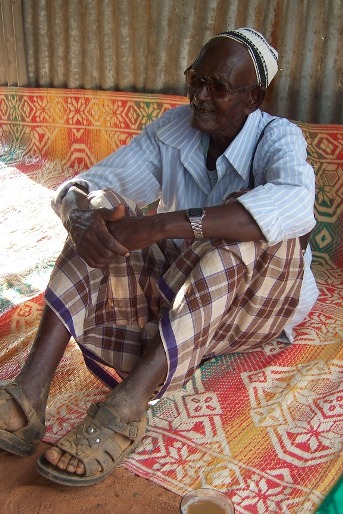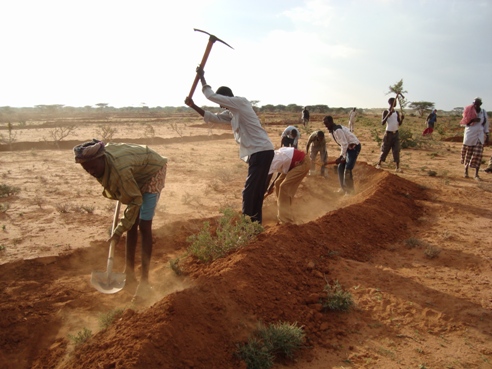Muhammed interrupted me by pounding the ground, laughing out loud and exchanging a few words with Seleban Yussuf , the village's elder sitting next to him.
"Unbelievable. Can you believe this guy came all the way from America to see Somaliland?," he said in Somali. "All the way just to talk to us. Sorry Mr. Louis, carry on."
Indeed, Muhammed Yassin Abdel Llahi was right. There aren't too many people that make the journey to Somaliland these days. The place is sort of the forgotten corner of what used to be a united Somalia. It has a President, a lower house, an upper house, its own money, and more importantly has been relatively stable for over 15 years. If you imagine Somalia as the number seven, Somaliland is at the top left corner, bordering tiny Djibouti and Ethiopia. It's one of the most underdeveloped regions I have ever seen.
Father of seven, Muhammed is the head of over 450 households, based in Ununley, in the heart of Somaliland. He tells me of "changing weather", of his seven children being away and of the drought that has hit the region and its people. All of the households are pastoralists, caring for animals and living a nomadic life.
The communities we met in Ununley told us that they've seen the climate changing in the last decade but "more drastically in the last four years". In Eastern Africa this means a lack of rain which affects every aspect of life for pastoralist communities. Little rain means no green pastures from which animals can feed themselves. The lack of water and irregular rains have become a critical problem for tens of thousands of herdsmen in the region
As a result, many animals become weak, sick and simply start dying one by one. The Ununley community lost 40% of its livestock last year as animals in search of green areas crumbled under the heat, including the stronger ones like camels and cows.
"This is new for us. We have never seen so many animals dying so quickly. There is even a new phenomenon when a cow or even a camel just collapses and dies right there. They would usually fight for a day or two. I think it's an illness they have," Muhammed tells me.
Faced with recurring poor rainy seasons, loss of livestock, loss of lives even, community leaders are wondering what to do next. They are even considering leaving the arid rural areas for the towns in search of a different life. But they are not there yet.
"The thought of splitting our community to go to cities is hard to imagine. What will we do? Beg? For now, we can only pray for rain. With a few days of rain, everything can be good again," the 45 year old leader told me, nervously biting his nails.
 Seleban Yussuf Noor, 75, Ununley village, Togheer, Somaliland
Seleban Yussuf Noor, 75, Ununley village, Togheer, Somaliland
Oxfam's partner in the region, Candlelight, recently responded to community requests to coordinate water projects. With the communities, it builds water dams, truck water into villages and improve water basins, called Burkads. In some instances, this has literally saved lives.
"Without water, people and livestock will die, but Oxfam has saved this from happening," explained Safia Hussein Ibrahim, a local villager. "Now we have cash, we can buy food for the children and fodder for the animals. We only ask those who have something to train those who are strong, educate people, give them healthcare. We are expecting God to change our situation in a good way."
With a few weeks left of what should be the rainy season, the people of Ununley are still hopeful. Despite having lost so much and seen their way of life threatened in the last decade, one thing that has not gone away is their resilience. A few rain showers before the end of the year.
That's all they pray for.
*********************************
For more information on Oxfam's work: http://www.oxfam.orgFollow the new blog on humanitarian issues: Conflict Voice
Our 2024 Coverage Needs You
It's Another Trump-Biden Showdown — And We Need Your Help
The Future Of Democracy Is At Stake
Our 2024 Coverage Needs You
Your Loyalty Means The World To Us
As Americans head to the polls in 2024, the very future of our country is at stake. At HuffPost, we believe that a free press is critical to creating well-informed voters. That's why our journalism is free for everyone, even though other newsrooms retreat behind expensive paywalls.
Our journalists will continue to cover the twists and turns during this historic presidential election. With your help, we'll bring you hard-hitting investigations, well-researched analysis and timely takes you can't find elsewhere. Reporting in this current political climate is a responsibility we do not take lightly, and we thank you for your support.
Contribute as little as $2 to keep our news free for all.
Can't afford to donate? Support HuffPost by creating a free account and log in while you read.
The 2024 election is heating up, and women's rights, health care, voting rights, and the very future of democracy are all at stake. Donald Trump will face Joe Biden in the most consequential vote of our time. And HuffPost will be there, covering every twist and turn. America's future hangs in the balance. Would you consider contributing to support our journalism and keep it free for all during this critical season?
HuffPost believes news should be accessible to everyone, regardless of their ability to pay for it. We rely on readers like you to help fund our work. Any contribution you can make — even as little as $2 — goes directly toward supporting the impactful journalism that we will continue to produce this year. Thank you for being part of our story.
Can't afford to donate? Support HuffPost by creating a free account and log in while you read.
It's official: Donald Trump will face Joe Biden this fall in the presidential election. As we face the most consequential presidential election of our time, HuffPost is committed to bringing you up-to-date, accurate news about the 2024 race. While other outlets have retreated behind paywalls, you can trust our news will stay free.
But we can't do it without your help. Reader funding is one of the key ways we support our newsroom. Would you consider making a donation to help fund our news during this critical time? Your contributions are vital to supporting a free press.
Contribute as little as $2 to keep our journalism free and accessible to all.
Can't afford to donate? Support HuffPost by creating a free account and log in while you read.
As Americans head to the polls in 2024, the very future of our country is at stake. At HuffPost, we believe that a free press is critical to creating well-informed voters. That's why our journalism is free for everyone, even though other newsrooms retreat behind expensive paywalls.
Our journalists will continue to cover the twists and turns during this historic presidential election. With your help, we'll bring you hard-hitting investigations, well-researched analysis and timely takes you can't find elsewhere. Reporting in this current political climate is a responsibility we do not take lightly, and we thank you for your support.
Contribute as little as $2 to keep our news free for all.
Can't afford to donate? Support HuffPost by creating a free account and log in while you read.
Dear HuffPost Reader
Thank you for your past contribution to HuffPost. We are sincerely grateful for readers like you who help us ensure that we can keep our journalism free for everyone.
The stakes are high this year, and our 2024 coverage could use continued support. Would you consider becoming a regular HuffPost contributor?
Dear HuffPost Reader
Thank you for your past contribution to HuffPost. We are sincerely grateful for readers like you who help us ensure that we can keep our journalism free for everyone.
The stakes are high this year, and our 2024 coverage could use continued support. If circumstances have changed since you last contributed, we hope you'll consider contributing to HuffPost once more.
Already contributed? Log in to hide these messages.
 Seleban Yussuf Noor, 75, Ununley village, Togheer, Somaliland
Seleban Yussuf Noor, 75, Ununley village, Togheer, Somaliland